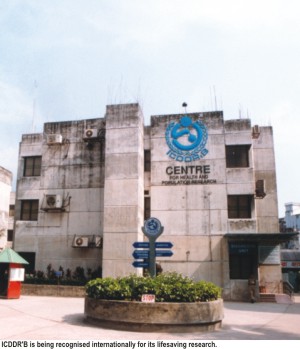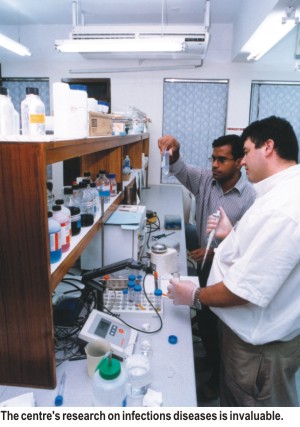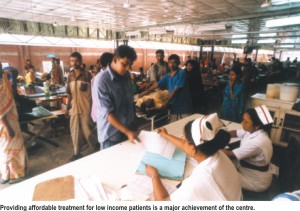|
Endeavour
Simple
solutions to deadly diseases
Christine
Wanner
Finally,
his family took him to the "cholera hospital". Only
skin and bones, too weak to walk, he was carried, by a simple
carriage, pulled by his family members. Muslim is one of the
200 patients, which is the number of people who come daily,
searching for free care and cure at the "cholera hospital",
officially called ICDDR'B, international Centre for Diarrhoeal
Disease Research, Bangladesh.
After
the registration, he will have to swallow a white coloured
solution, basically one spoon of each, sugar and salt, dissolved
in water. This is ORS, Oral Rehydration Solution, discovered
by the centre in the late sixties.
 Thrilled
by their discovery, scientists of the hospitals' research
section spread their knowledge without caring for their right
of intellectual property. While a lucrative opportunity had
slipped away, this important discovery saved millions of lives
and in the end contributed to the institution's international
recognition and integration into the scientific community. Thrilled
by their discovery, scientists of the hospitals' research
section spread their knowledge without caring for their right
of intellectual property. While a lucrative opportunity had
slipped away, this important discovery saved millions of lives
and in the end contributed to the institution's international
recognition and integration into the scientific community.
"Anything
that comes from Bangladesh is considered suspect and is scrutinised,
that is why it took the international community so long to
accept our treatment", says Ishtiaque A. Zaman, head
of external relations. "ORS appeared too simple to be
a proper treatment for a deadly disease, in the developed
countries. It took over 20 years for the recognition of ORS
not just as 'the poor man's medicine'."
In the
past few decades, the centre's activities have broadened;
it is involved in clinic research and vaccine sciences, in
reproductive health (HIV/AIDS) and family planning, in nutrition
research and mother and childcare.
These
programmes have to be covered by annual donations. In the
last few years, this has reached around 18 million US dollars,
donated from 55 countries and partner organisations, including
the Government of Bangladesh (6%), universities and NGOs.
Most of
the donations in the past were for special projects and thus
bound to research projects. The donors wanted to be sure that
their money was being utilised properly. The centre itself,
of course, prefers 'core funding' to be used to the hospital's
needs. That fund allowed, for example, free treatment of flood-related
disease last summer.
By then,
900 patients were knocking at the hospital's door every day.
"Our capacity is very flexible," smiles Hannah Lemon,
senior associate of external relations, "we then expanded
to the roof of the hospital. Improvised beds, additional staff
were deployed for late shifts and for distributing treatment
and food to the patients and their waiting relatives, as well
as cleaning up the beds and floors."
 With
international recognition and with its treatments being recommended
by the WHO and Unicef, research, knowledge transfer and the
dissemination of treatments, developed by the Bangladesh based
centre will be much easier. As Ishtiaque Zaman puts it, the
hospital is "a gold mine" to what concerns the research
potential, without naming costs, returns on investment or
profits, as the centre understands itself as a non profit
organisation. With
international recognition and with its treatments being recommended
by the WHO and Unicef, research, knowledge transfer and the
dissemination of treatments, developed by the Bangladesh based
centre will be much easier. As Ishtiaque Zaman puts it, the
hospital is "a gold mine" to what concerns the research
potential, without naming costs, returns on investment or
profits, as the centre understands itself as a non profit
organisation.
For voluntarily
taking part in the centre's studies, patients of the hospital
get up to 1000 Taka, depending on the duration and the costs.
To that amount of money, developed countries could not find
willing patients.
Furthermore,
ICDDR'B has been fostering a health-related, socio-demographic
database for the past forty years. During that time, a population
of 2,20,000 persons have been monitored in its second centre
at Matlab, some 130 kilometers further south of Dhaka.
"We
know everything about these people: when they were born, vaccinated,
when they have got married, become pregnant, took contraceptives,
moved their homes, and even when and where they died,"
resumes Dr. Mohammad Yunus, who heads the Matlab research
centre and has been shaping it and its science since 1968.
The gathered
knowledge extends to eating and working habits of the monitored
population, which makes the ICDDR'B an attractive partner
for the WHO and international NGOs, in dealing with health
issues in developing countries. "Our solutions must be
practical in daily rural life and affordable for poor people,"
says Dr. Yunus.
If the
international donors expect profits from the centre's knowledge
and research, the centre's head of external relations, Ishtiaque
Zaman answers: "Of course, the pharmaceutical companies
are all in the game. But when it comes to commercialisation,
one has to come to an agreement."
 This
is planned to happen with the centre's latest discovery, a
dissolvable zinc tablet for malnourished children. After ORS
incident, the centre has become more cautious. "We have
to be sure, that we keep the intellectual properties of our
discoveries," says Zaman. This
is planned to happen with the centre's latest discovery, a
dissolvable zinc tablet for malnourished children. After ORS
incident, the centre has become more cautious. "We have
to be sure, that we keep the intellectual properties of our
discoveries," says Zaman.
"Besides
that, the treatment has to be affordable for the poorest of
the poor. Therefore, it will not be a profit making business."
Isthiaque Zaman is convinced.
The zinc
tablet is a part of a programme in the sector of child health
and nutrition research, called, Scaling Up Zinc Treatment
for Young Children (SUZY). Zinc, it has been discovered, shortens
the time of illness in case of diarrhoea by a forth. In addition,
it prevents further relapses. Moreover, it seems to have a
positive effect to the recovering process from pneumonia as
well.
In developing
countries, 18 to 20% of the infected children under five years
do not survive diarrhoea or pneumonia. Thus, malnutrition
especially zinc deficiency plays a vital role. Over 60% of
children less than five years are malnourished in Bangladesh.
SUZY has
been launched in 2004 and is supported by powerful US based
Gates Foundation. "It is likely to become our new flagship,
after ORS," says Isthiaque A. Zaman.
Copyright
(R) thedailystar.net 2004
| 